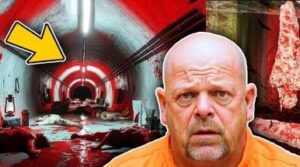
The Las Vegas strip glitters with the promise of fortune. But behind one storefront’s familiar facade, a darkness lurked that no television camera ever captured. Rick Harrison, the charismatic, knowledgefilled businessman viewers welcomed into their homes weekly through Pawn Stars, built an empire on history, authenticity, and trust. But what if everything you thought you knew about the Pawn Broker with the encyclopedic mind was built on lies? FBI agents who raided Harrison’s sprawling Las Vegas mansion weren’t prepared for
what they discovered hidden behind the walls of the seemingly ordinary millionaire’s home. 25 bodies meticulously concealed secret rooms housing evidence of crimes spanning decades. Documents cons in Lexington, North Carolina, where he was born on March 22nd, 1965. His early life was shaped by challenge, particularly his battle with childhood epilepsy. Confined to bed during severe episodes, young Rick turned to books, developing a voracious appetite for knowledge that would later become his trademark. The pages of
history books became his escape, an ironic foundation for a man whose own history would eventually become a cautionary tale. The Harrison family relocated to Las Vegas in 1981, seeking opportunity in the desert oasis. By 1989, Rick and his father had established Gold and Silver Pawn Shop, laying the groundwork for what would become a landmark business. What began as a modest pawn operation gradually transformed into something extraordinary, especially when television producers recognized the entertainment value in the historical
items passing through their doors. In 2009, Pawn Stars premiered, Catapulting Rick Harris The American Dream, a self-educated man who built success through hard work, knowledge, and determination. The first cracks in Harrison’s carefully constructed facade appeared when financial investigators noticed irregularities in the pawn shops transactions. What began as a routine audit expanded into something far more sinister as patterns emerged, suggesting the legitimate business might be a front for illicit activities. The FBI launched
an investigation initially focused on potential financial crimes, tax evasion, money laundering, illegal transactions. Agents expected to find documentation of financial wrongdoing. They weren’t prepared for the horror that awaited them behind the mansion’s tasteful exterior. The raid on Harrison’s home began like any other execution of a search warrant. Methodical by the book. But when agents discovered the first hidden compartment behind what appeared to be a solid wall in Harrison’s study,
the investigation took a disturbing turn. Inside the hidden space, investigators found meticulously organized records documenting connections to organized crime figures, black market transactions involving illegally obtained historical artifacts, and evidence linking Harrison to an underground network of criminal activities. The documents revealed a disturbing truth. Many items featured on Pawn Stars had been obtained through illegal channels. Their provenences falsified for television. The shop that
had built its reputation on authenticity was trafficking in stolen history. But the physical evidence of financial crimes pald in comparison to what agents discovered as they continued their search. A hidden basement area accessible only through a sophisticated mechanism disguised as an ordinary bookshelf contained the first of what would eventually total 25 bodies. victims whose disappearances spanned nearly two decades. Forensic investigators worked tirelessly to identify the victims, many of whom
appeared to have connections to Harrison’s underground dealings. Some were competitors in the black market antiquities trade. Others had threatened to expose aspects of Harrison’s operation. The systematic nature of the concealment suggested a calculated long-term operation rather than crimes of passion. The man who had built an empire on historical knowledge had been meticulously erasing his own dark history, one victim at a time. When news of the discoveries broke, the public reaction was one of stunned disbelief.
How could the affable businessmen who shared of a calculating criminal? The television network immediately cancelled Pawn Stars, distancing themselves from Harrison and the tainted legacy of what had been their flagship program. Gold and Silver Pawn Shop, once a tourist destination, became a Macob curiosity with visitors photographing the exterior from across the street as foot traffic to nearby businesses plummeted. Las Vegas tourism officials scrambled to minimize the impact of the scandal on
the city’s image. The repercussions extended beyond Harrison himself to those closest to him. His son, Cory, who had featured prominently on the show, maintained complete ignorance of his father’s criminal activities. As investigators dug deeper, they found no evidence linking Cory to the crimes, supporting his claims of innocence. Nevertheless, the younger Harrison found himself entangled in the fallout, his own reputation forever linked to his father’s actions. The shop’s other
familiar face, Austin Chumley Russell, expressed shock when interviewed, claiming he had never suspected the dark currents flowing beneath the surface of the business. While investigators found no direct connection between Russell and the most serious crimes, they did uncover evidence suggesting he may have been aware of some financial irregularities. The affable comic relief of pawn stars found himself facing minor charges related to failure to report suspicious activities. The Harrison family was shattered by the revelations.
Rick’s ex-wives came forward with stories of controlling behavior and mysterious absences that in retrospect aligned with the timeline of disappearances. now attributed to him. Family members described compartmentalization that seemed pathological. How Harrison could transition seamlessly from his criminal activities to family gatherings without showing any sign of the darkness within him. As the case moved to trial, prosecutors assembled overwhelming evidence linking Harrison directly to the murders and criminal enterprise. DNA
evidence recovered from the hidden rooms, financial records documenting illegal transactions, and testimony from associates who had witnessed Harrison’s darker side created an airtight case. Harrison’s defense team attempted to argue that their client had been set up by jealous competitors or organized crime figures looking for a fall guy, but the evidence proving his direct involvement was insurmountable. The trial became a media spectacle with each day bringing new revelations about the
extent of Harrison’s criminal network. Former associates testified about his involvement in trafficking stolen artifacts, describing how items that had featured prominently on Pawn Stars had been illegally obtained, their histories fabricated to make compelling television. The testimony most damaging to Harrison’s defense came from a former black market dealer who detailed how Harrison had used his television fame as the perfect cover for his criminal enterprise. Who would suspect the guy
educating America about history on TV was actually stealing it? The witness testified his public persona was his greatest asset. When Harrison took the stand in his own defense, his famous composure crumbled under cross-examination. The prosecutors methodically dismantled his denials, confronting him with evidence that contradicted each claim of innocence. The jury deliberated for just 6 hours before returning with guilty verdicts on all counts, including multiple charges of firstdegree murder, racketeering, and
trafficking in stolen goods. The judge, delivering a sentence of multiple life terms without possibility of parole, noted the particular betrayal inherent in Harrison’s crimes. You built a public reputation on knowledge, history, and trust while privately desecrating those very values. Your crimes are made more reprehensible by the calculated deception you maintained for years in the public eye. As Harrison was led from the courtroom, the empire he had built lay in ruins. The pawn shop that had
been a landmark, was permanently closed, its inventory seized as evidence. The television show that had made him famous became a footnote in true crime documentaries rather than a celebration of history and entrepreneurship. In the aftermath, Las Vegas worked to distance itself from the Harrison legacy. Tourism officials removed all references to pawn stars from promotional materials and the vacant shop building was eventually demolished to make way for new development, erasing the physical reminder of what had transpired there.
The victim’s families finally received answers about their missing loved ones. Though the closure came with the horrible knowledge of what had happened. Memorial services were held, bringing together people connected only by the tragic way their family members lives had ended. The Rick Harrison case serves as a chilling reminder that appearances can be deceiving, that the personas we welcome into our homes through our screens may conceal depths we cannot imagine. It challenges us to consider
how easily we assign trust based on perceived expertise and charisma. How completely we can be fooled by those skilled in the art of deception. The ultimate tragedy of Rick Harrison lies not just in the lives he took, but in the betrayal of public trust. How completely he convinced millions that he was a man worthy of admiration while building an empire on criminal enterprise and murder. As investigators closed the final chapter on the case, they reflected on the complexity of human nature, how a single individual
could contain both the impressive knowledge Harrison displayed, and the capacity for the calculated violence revealed in the investigation. The man who had built a career authenticating historical artifacts had himself been the greatest forgery of all. Remember, the face someone shows to the world may be just a mask. True character reveals itself in the shadows, in the choices made when no one is watching. The Rick Harrison case reminds us to look beyond charisma and celebrity, to remember that
sometimes the most dangerous predators are those hiding in plain sight. The next time you welcome someone into your home through your screen, remember what you see may only be what they want you to
